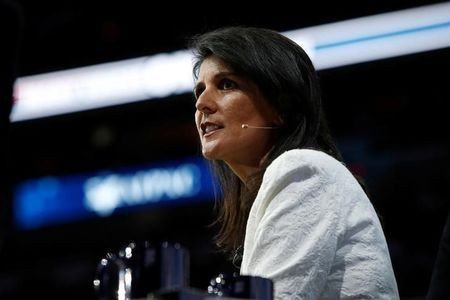(VOVworld) – The European Union (EU) and the United Nations (UN) will co-host a conference on the future of Syria on Wednesday in Brussels. The 2-day conference will discuss humanitarian aid, political transition, and reconstruction of Syria. After 6 years of civil war, Syria is now about to form a transitional government involving factions’ representatives.
 |
| US Ambassador to the UN Nikki Haley (Photo: Reuters) |
Syria’s civil war has claimed 400,000 lives and displaced millions of people, triggering a migrant crisis in Europe. In the past year, UN-sponsored peace talks between the Syrian government and opposition groups, the latest on March 13 negotiation in Kazakhstan, failed.
New approach on Syria
There have been positive signs for the Syrian crisis. The EU on March 14th announced an ambitious plan to support Syria’s reconstruction, calling it a "dividend" to encourage warring parties to reach a peace deal. The EU said it is ready to play a leading role once a "genuine political transition" is underway. The EU has already mobilized some 9.4 billion euros, of which nearly a billion has been spent inside Syria on humanitarian missions. The EU will also support the drafting of a new constitution and the organization of elections, and will help with the election monitoring.
The US has signaled a remarkable change in stance on Syria. Last Friday, US Ambassador to the UN Nikki Haley said removing Syrian President Al Assad is no longer a priority. She admitted that the fate of Syria is up to the Syrian people, indicating a big change in American policy, which observers say will lead to major changes in Syria’s politics.
Uneven path of reconstruction
The international community can be hopeful for the UN-brokered peace talks for Syria, which may allow Al Assad to be involved in the transition when a provisional government is formed.
But a truly stable peace is still a long way off. The Trump administration can mull military cooperation with Russia in the war against terror, but in the long run, the US will want to challenge Russia’s influence with Syrian factions, following the political transition roadmap. The EU, which has had a fuzzy role in Syria, is now aggressively asserting its role a peace broker. Will Russia, Iran, Turkey, Saudi Arabia, and other players accept the EU’s new role?
Syria’s future politics will continue to be directly influenced by hard-line oppositions to Al Assad, bitter conflicts between the Shiites and the Sunnis – led by Iran and Saudi Arabia, and Turkey’s mistrust of the Kurds, the US’s main proxy force in Syria.
The future of Syria ought to be decided by the Syrians, with impartial support from other parties. But Syria’s reconstruction after 6 years of civil war will not be simple.